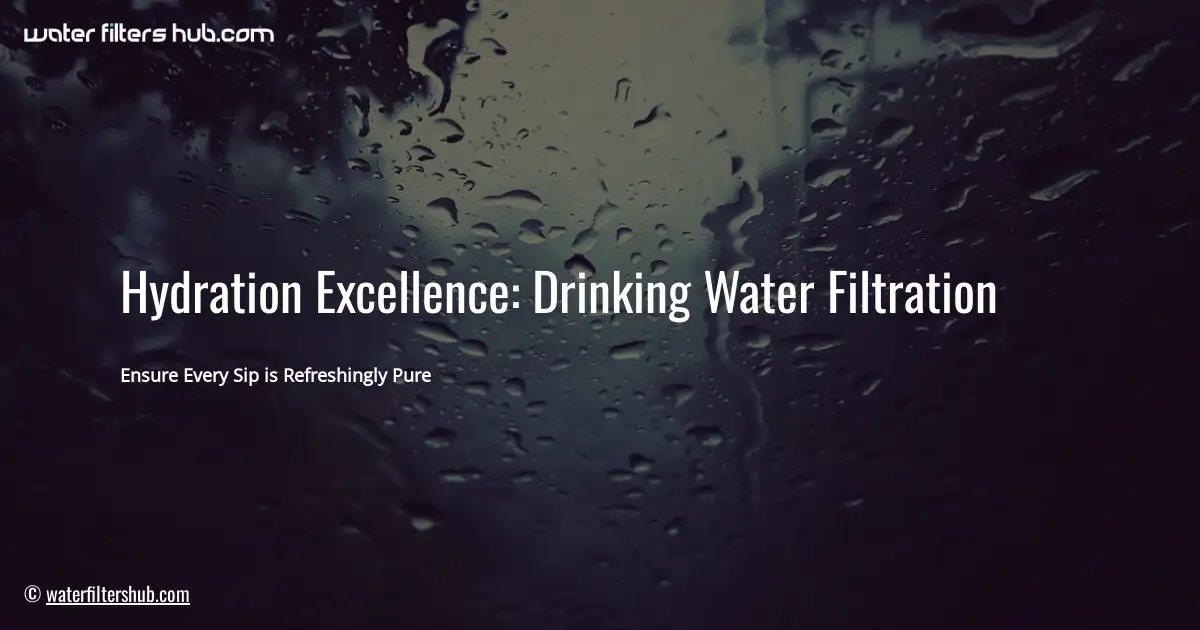Budgeting for Your Water Filtration Needs
Introduction
💧 Water is life, and clean water is essential for our health and well-being. But with so many different water filters on the market, it can be tough to know how much you should budget for. Let’s dive into the factors that affect the cost of water filters and help you make an informed decision. 💰
Factors to Consider
When budgeting for a water filter, there are a few key factors to keep in mind:
- Type of filter: Countertop, under-sink, whole-house, and reverse osmosis systems all vary in price.
- Brand: Different brands offer different features and warranties, which can affect the cost.
- Features: Some filters remove more contaminants than others, and some have additional features like UV disinfection or water softening.
- Capacity: The size of the filter will determine how much water it can purify before needing to be replaced.
- Installation: Professional installation can add to the cost, but it’s often worth it for peace of mind.
Types of Water Filters
Under-sink filters are installed beneath the sink, providing clean water directly to the faucet. They’re more powerful than countertop filters, effectively removing contaminants like lead, chlorine, and cysts. These filters typically cost between $100 and $400, depending on the brand, size, and features. Installation can range from $50 to $200, depending on the complexity of the setup.
Cost of Different Types of Water Filters
The cost of a water filter can vary significantly depending on several factors:
- Brand: Different brands may charge different prices for similar products.
- Features: Filters with more advanced features, such as multiple filtration stages or digital displays, tend to be more expensive.
- Capacity: Larger filters that can handle more water flow typically cost more than smaller ones.
- Materials: The materials used in the construction of the filter can also affect the price. For example, stainless steel filters are usually more expensive than plastic ones.
- Warranty: Filters with longer warranties may cost more upfront, but they can save you money in the long run if you need to replace them less often.
Professional Installation vs. DIY
When it comes to installing your water filter, you have two options: professional installation or do-it-yourself (DIY). Professional installation typically costs more, but it can be worth it if you’re not comfortable working with plumbing or if you have a complex system. DIY installation is cheaper, but it’s important to make sure you do it correctly to avoid leaks or damage.
Estimated Installation Fees
The cost of professional installation will vary depending on the type of filter you’re installing and the complexity of the job. Here are some estimated fees:
| Type of Filter | Estimated Installation Fee |
|---|---|
| Countertop filter | $50-$150 |
| Under-sink filter | $100-$250 |
| Whole-house filter | $200-$500 |
| Reverse osmosis system | $300-$700 |
If you’re considering DIY installation, be sure to follow the manufacturer’s instructions carefully and use the correct tools. If you’re not sure about something, it’s always best to call a professional.
Maintaining your water filter is crucial to ensure optimal performance and longevity. Regular filter replacements are essential, and their frequency depends on the type of filter and the quality of your water. For example, countertop filters may require monthly replacements, while whole-house filters can last up to a year.
The cost of replacement filters varies depending on the brand, size, and type. On average, you can expect to spend anywhere from $20 to $100 per year on filter replacements.
In addition to filter replacements, you may also need to clean and service your water filter periodically. This involves removing any sediment or debris that may accumulate over time. The frequency of cleaning and servicing will depend on the type of filter and the quality of your water.
The estimated annual maintenance expenses for a water filter can vary widely depending on the factors mentioned above. However, as a general rule of thumb, you can expect to spend between $50 and $200 per year on .
HOW MUCH WATER FILTER COST ON YOUTUBE
Investing in a water filter can lead to significant long-term savings, making it a worthwhile investment for your health and wallet. 💸
One major cost-saving benefit is the potential reduction in bottled water purchases. The average household spends hundreds of dollars annually on bottled water, which can add up over time. 💰 With a water filter, you can enjoy clean, filtered water right from your tap, eliminating the need for expensive bottled water and saving you a bundle in the long run. 💰
Moreover, improved water quality can lead to reduced healthcare costs. Contaminants in tap water can contribute to health problems such as gastrointestinal issues, skin irritation, and even more severe conditions. 🤕 By removing these impurities, a water filter can help protect your health and potentially reduce the likelihood of costly medical expenses. 🏥
Health Benefits 💧
Water filtration systems not only remove harmful contaminants but also enhance the taste and odor of your water. 💧 Imagine sipping on crisp, refreshing water that tantalizes your taste buds. No more metallic aftertaste or unpleasant odors! A water filter acts like a culinary wizard, transforming ordinary tap water into a gourmet beverage. 🚰
Gone are the days of relying on bottled water for a refreshing drink. With a water filtration system, you can enjoy pure, great-tasting water straight from your tap. 💧 It’s like having a personal hydration oasis in your home. 🏡
Environmental Benefits 🌍🌱
Water filters play a crucial role in safeguarding our planet’s health. By reducing our reliance on plastic bottles, we curb the staggering amount of waste that pollutes our oceans and landfills. Each year, millions of plastic bottles end up in our environment, harming wildlife and contaminating our ecosystems. Water filters empower us to make a positive impact by eliminating the need for single-use plastics.
Moreover, water filters conserve water resources. The production of bottled water requires a significant amount of energy and water, contributing to the depletion of our precious natural resources. By choosing a water filter, we can reduce our water consumption and protect our planet’s water supply for future generations.
Choosing The Right Water Filter For Your Needs 💦
When selecting a water filter, it’s crucial to consider your budget, water quality, and usage patterns. Research different options and compare features to find the best fit for you. Like a tailor-made suit, the perfect water filter should complement your lifestyle and provide the protection you need.
Imagine sipping on crystal-clear, refreshing water every day. A water filter can be your knight in shining armor, banishing impurities and contaminants from your tap water. But with so many options available, choosing the right one can be a bit of a puzzle.
Consider your budget first. Water filters come in a range of prices, so set a realistic limit and explore options within that range. Just like a budget-friendly wardrobe, there are affordable filters that can still provide excellent water quality.
Next, take a closer look at your water quality. Different filters target specific contaminants, so it’s important to know what’s lurking in your water supply. A water test can provide valuable insights and help you choose the filter that’s most effective against those nasties.
Finally, think about your water usage patterns. If you’re a heavy water drinker, you’ll need a filter with a higher capacity. It’s like buying a car – you want one that can handle your daily commute and weekend adventures.
By considering these factors, you can narrow down your choices and find the water filter that’s the perfect match for your needs and budget. Remember, clean water is like a precious gem – it’s worth investing in to ensure your health and well-being.
Conclusion
The Importance of Budgeting for Water Filtration
When it comes to our health and well-being, investing in a water filter is like giving our bodies a daily dose of “liquid gold.” 💧 Not only does it remove harmful contaminants, but it also elevates the taste and odor of our water, making it a pleasure to drink. 💦
But before diving into the world of water filtration, it’s crucial to plan your budget. 💰 Consider your financial situation, water quality concerns, and usage patterns. By doing so, you can find the perfect filter that fits your needs and wallet. Remember, clean water is an investment in your health and happiness, and it’s worth every penny! 💸
FILTERING OR TREATING DRINKING WATER AT HOME | PORTLAND.GOV
CHOOSING HOME WATER FILTERS & OTHER WATER TREATMENT SYSTEMS | CDC
HOW TO OPEN WATER FILTER CANDLE
HOW GOOD ARE REFRIGERATOR WATER FILTERS
HOW EFFECTIVE ARE WATER FILTERS
HOW MUCH ARE WATER FILTERS
FILTER COST FOR WATER PURIFIER







Leave a Reply